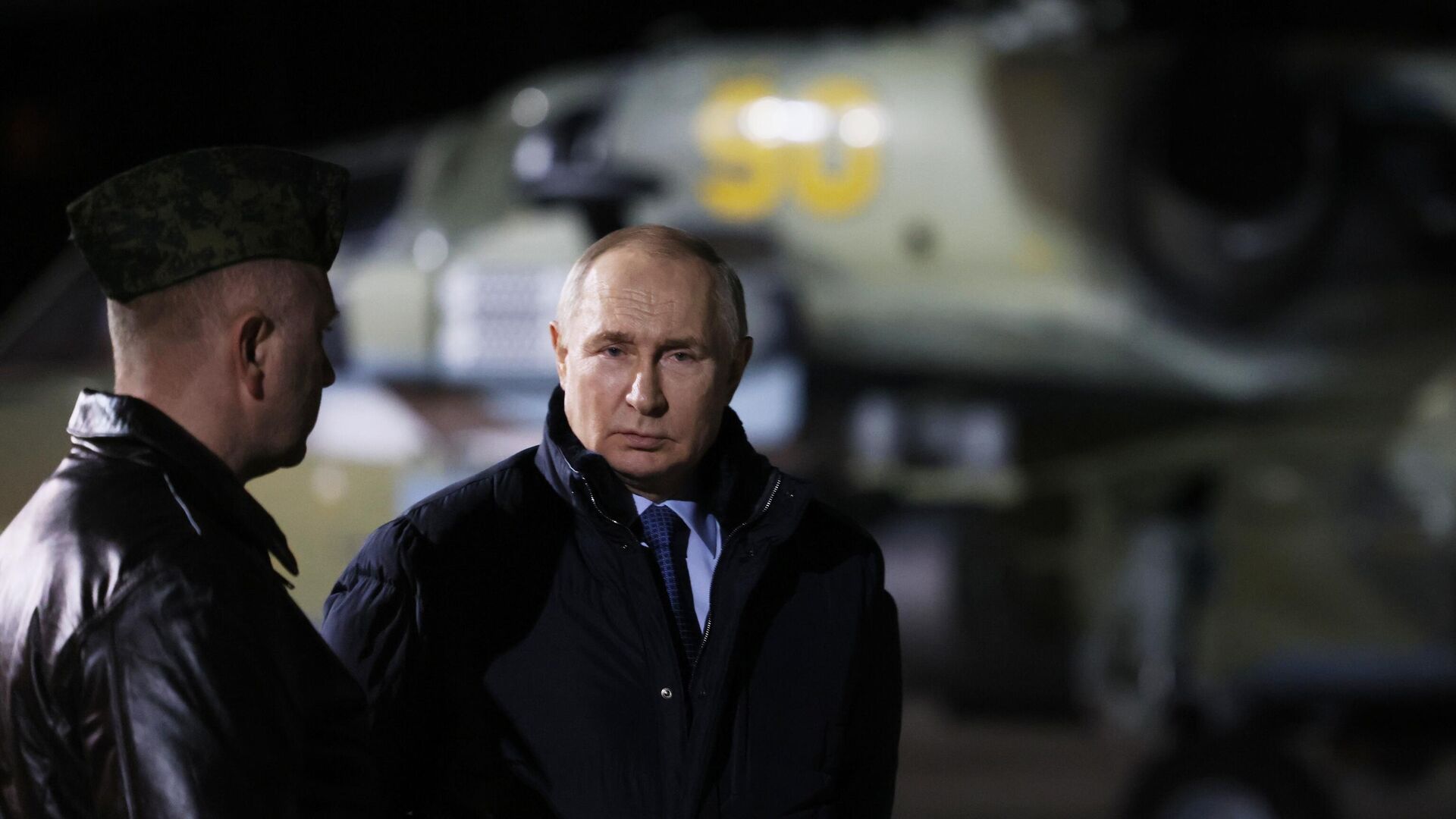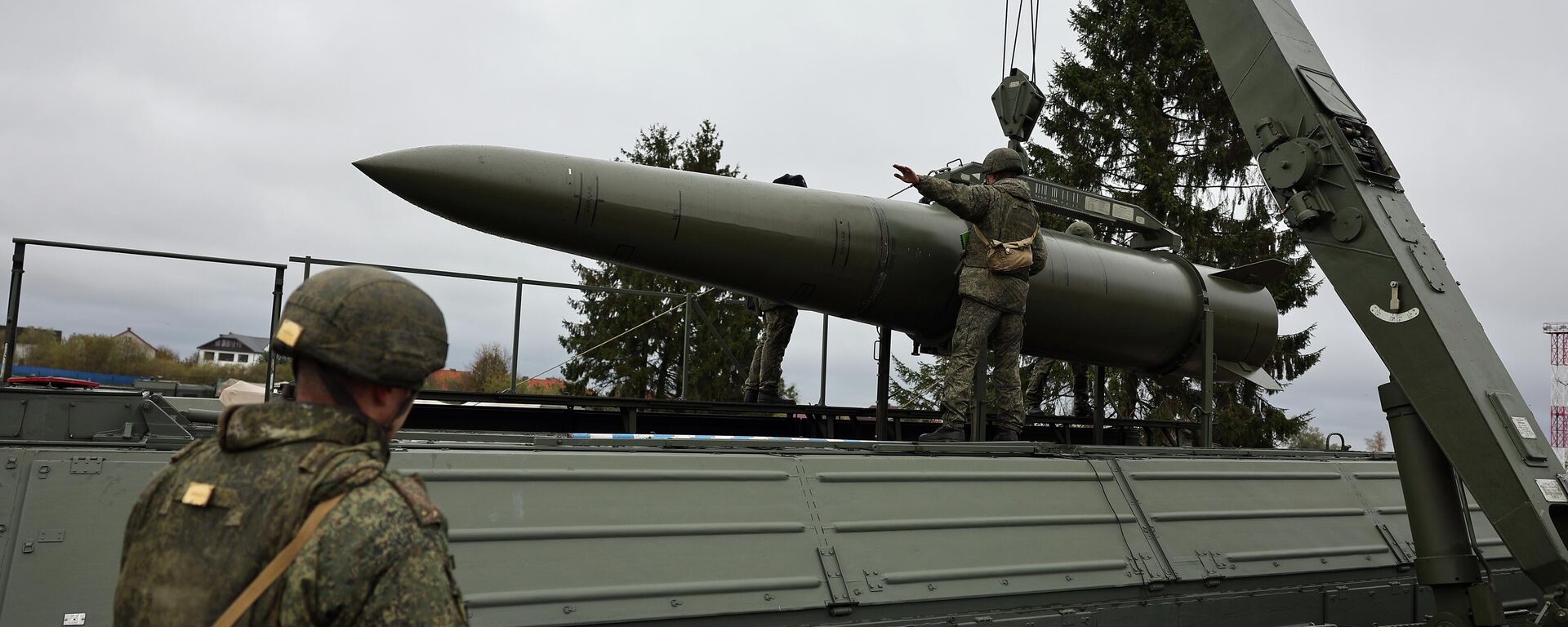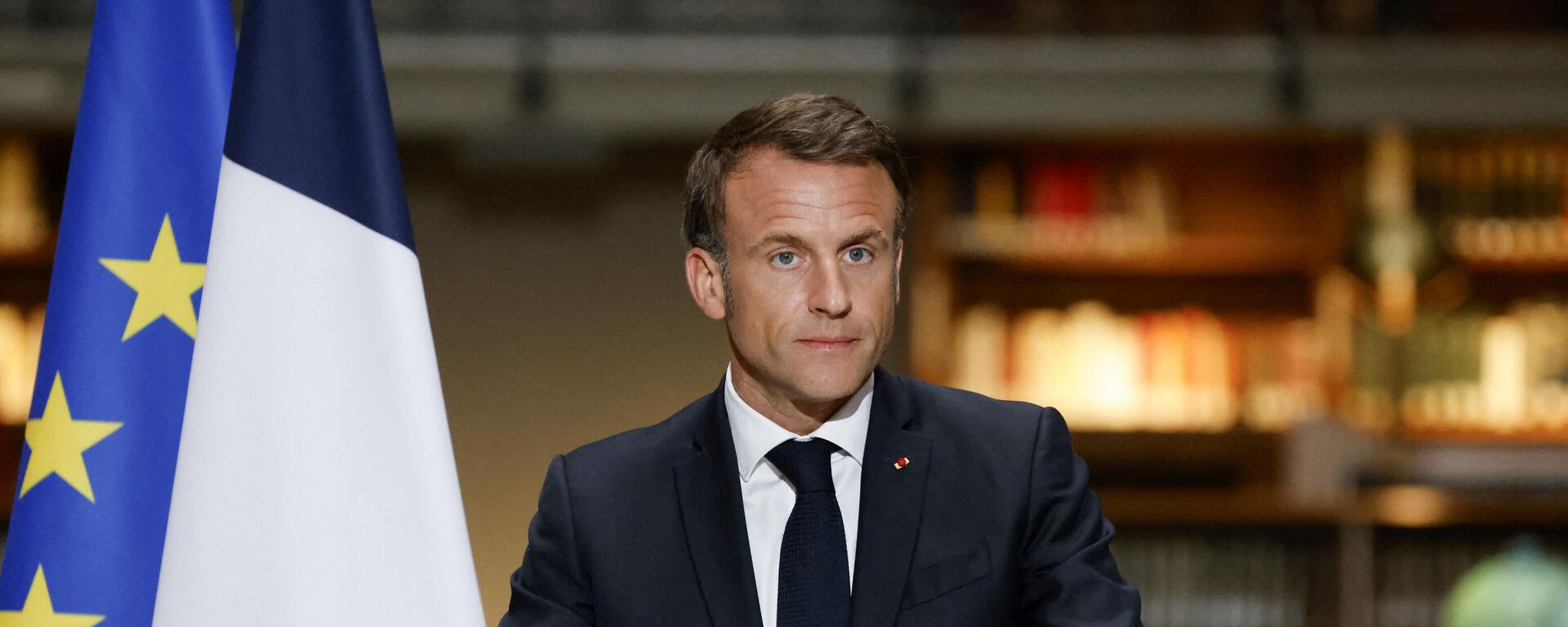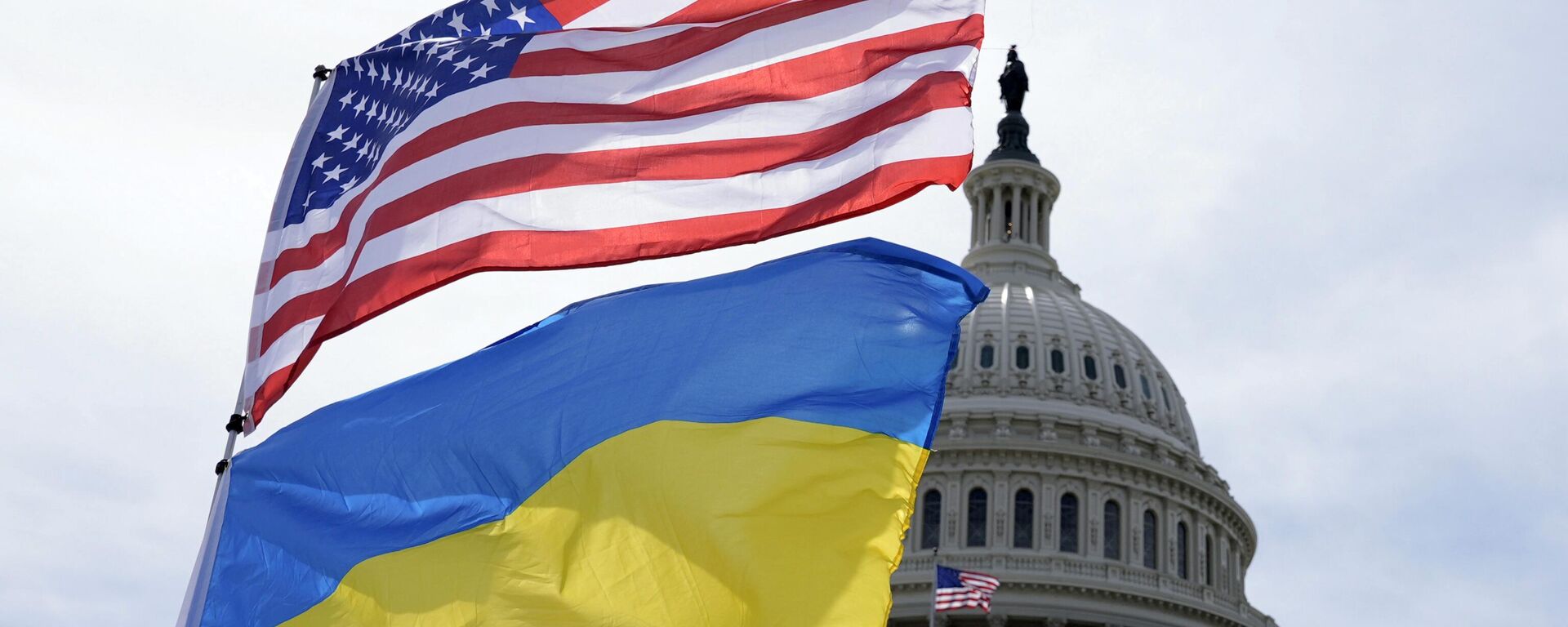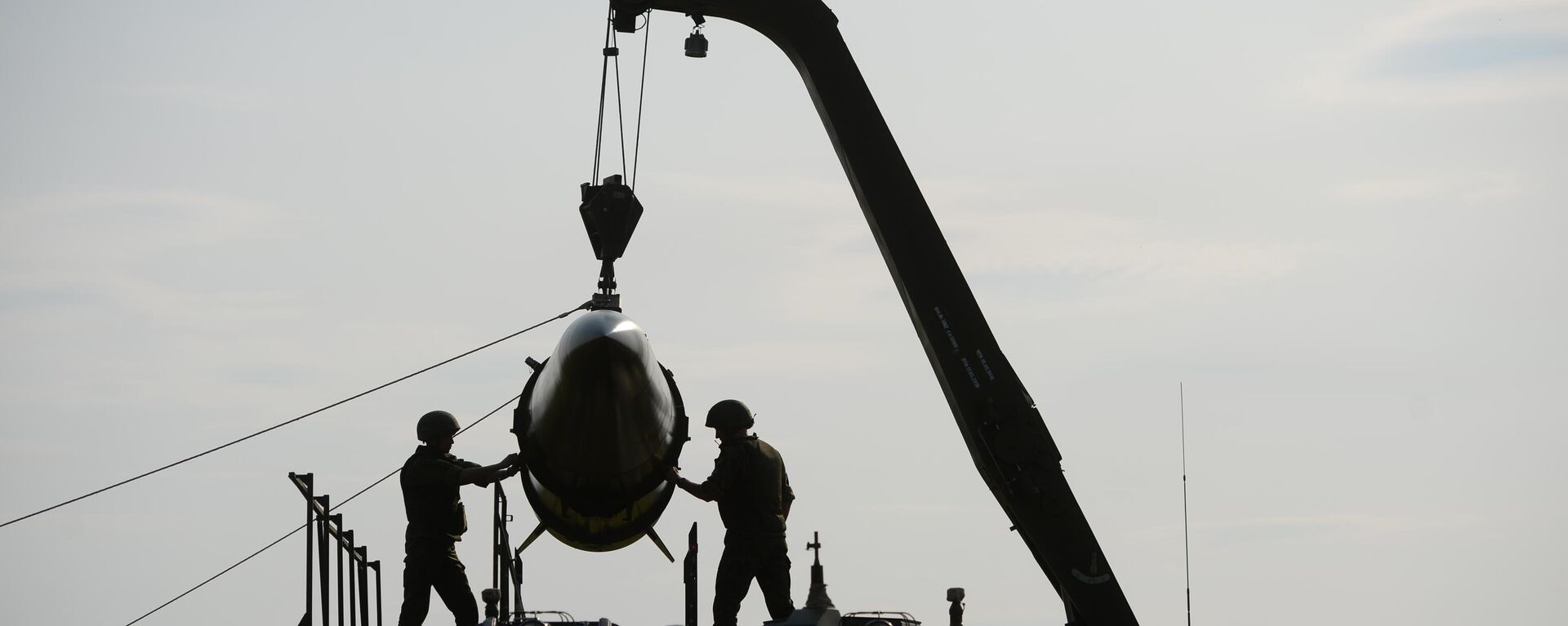https://sputnikglobe.com/20240506/russias-not-bluffing-tactical-nuke-drills-are-deafening-warning-to-nato-to-stay-out-of-ukraine-1118294192.html
‘Russia’s Not Bluffing’: Tactical Nuke Drills are Deafening Warning to NATO to Stay Out of Ukraine
‘Russia’s Not Bluffing’: Tactical Nuke Drills are Deafening Warning to NATO to Stay Out of Ukraine
Sputnik International
Russia’s military has parried bellicose statements by officials and lawmakers in Washington, Paris and London about deploying troops in Ukraine by announcing drills involving battlefield nuclear weapons. Sputnik asked Earl Rasmussen, a 20-year veteran of the US Army-turned independent military and foreign affairs observer, what it all means.
2024-05-06T17:35+0000
2024-05-06T17:35+0000
2024-05-06T17:35+0000
analysis
earl rasmussen
volodymyr zelensky
russia
ukraine
nato
us army
escalation
drills
exercises
https://cdn1.img.sputnikglobe.com/img/07e8/03/1b/1117591513_0:0:3070:1728_1920x0_80_0_0_6b3e881083daf2d5ee19bf46f9a55ec0.jpg
The Russian Foreign Ministry has characterized Russia’s upcoming tactical nuclear missile drills as a bid by Moscow to “cool down the ‘hot heads’ in Western capitals” threatening to deploy ground troops in Ukraine, and take other aggressive steps which threaten to escalate the proxy war in Ukraine into a full-blown Russia-NATO conflagration.This includes threats to provide new forms of “direct assistance” to Kiev, including the transfer of increasingly advanced weapons to the Zelensky regime, as well as the US decision to tear up arms control agreements with Russia in a bid to militarize both Europe and Asia, Moscow said.The drills should “help [NATO] realize the possible catastrophic consequences of the strategic risks they generate, and keep them from both assisting the Kiev regime in its terrorist actions, and from being drawn into a direct armed confrontation with Russia,” the Ministry said.Moscow also warned that it will treat any F-16 fighter jets that NATO plans to deliver to Ukraine as potential carriers of nuclear weapons, and that it considers the decision to supply them as “a deliberate provocation.” Combined with Poland’s talk of willingness to deploy US nuclear weapons on its soil, reports of French mercs already fighting in Ukraine, and other provocations, the Foreign Ministry emphasized that the Western bloc’s efforts signal a deliberate push “toward a further escalation of the Ukrainian crisis toward an open military clash between NATO and Russia as part of the implementation of the hostile course of inflicting a ‘strategic defeat’ on our country.”Separately on Monday, the Ministry summoned British Ambassador to Russia Nigel Casey to warn him over the implications of Foreign Minister David Cameron’s comments during his May 2 visit to Kiev about the admissibility using British weaponry to carry out strikes on Russian territory, stressing that the comments signal London’s admission of its role as a direct party to the Ukrainian crisis, and that Moscow will treat it accordingly.“The ambassador was told that the Russian side views D. Cameron’s words as evidence of a serious escalation, and confirmation of London’s growing involvement in military operations on the side of Kiev. N. Casey was warned that the response to Ukrainian strikes using British weapons on Russian territory could include any British military facilities and equipment on the territory of Ukraine and beyond,” the ministry said.Moscow separately summoned French Ambassador to Russia Pierre Levy “in connection with…bellicose statements by the French leadership,” and France’s growing involvement in the Ukrainian crisis.Reading Russia’s Signals“This is a signal to the Western leaders that they are serious. They are not bluffing,” retired US Army Lt. Col. Earl Rasmussen told Sputnik, commenting on the flurry of statements by the Russian military, the Kremlin and the Foreign Ministry about Russia missile forces’ plans to hold tactical nuclear weapons drills in the Southern Military District amid NATO threats in Ukraine.“I don't believe that Russia wants to do this. I believe they're trying to send a signal to caution the Western leaders from escalating further,” the 20-year US Army veteran-turned international and military affairs commentator added.Unfortunately, Rasmussen warned, the hostile statements coming out of Western capitals about “getting engaged” in Ukraine if the Ukrainian front collapses serve to increase the risks of a direct clash. “This is a very, very dangerous provocation, a very dangerous escalation. I would caution Western leaders not to do that,” he urged.“Ukraine is not a NATO ally,” Rasmussen stressed, pointing out that Kiev at best is a kind of “pseudo” ally, having received years of funding and training from NATO countries, but having no obligation from the bloc to come to its aid, much less perish in a potential flashpoint with Russia.
https://sputnikglobe.com/20240506/russias-general-staff-preparing-for-drills-to-practice-use-of-non-strategic-nuclear-weapons-1118283243.html
https://sputnikglobe.com/20240506/macron-denies-france-waging-war-against-russia-1118293536.html
https://sputnikglobe.com/20240506/us-will-send-aid-to-ukraine-until-start-of-conflict-with-china---former-us-congressman-1118292174.html
https://sputnikglobe.com/20240506/signal-to-nato-powers-playing-war-in-ukraine-why-russia-is-drilling-its-tactical-nuclear-forces-1118288990.html
russia
ukraine
Sputnik International
feedback@sputniknews.com
+74956456601
MIA „Rossiya Segodnya“
2024
News
en_EN
Sputnik International
feedback@sputniknews.com
+74956456601
MIA „Rossiya Segodnya“
Sputnik International
feedback@sputniknews.com
+74956456601
MIA „Rossiya Segodnya“
why is russia drilling its tactical nuclear forces, are we heading for world war 3
why is russia drilling its tactical nuclear forces, are we heading for world war 3
‘Russia’s Not Bluffing’: Tactical Nuke Drills are Deafening Warning to NATO to Stay Out of Ukraine
Russia’s military has parried bellicose statements by officials and lawmakers in Washington, Paris and London about deploying troops in Ukraine by announcing drills involving battlefield nuclear weapons. Sputnik asked Earl Rasmussen, a 20-year veteran of the US Army-turned independent military and foreign affairs observer, what it all means.
The Russian Foreign Ministry has characterized Russia’s
upcoming tactical nuclear missile drills as a bid by Moscow to “cool down the ‘hot heads’ in Western capitals” threatening to deploy ground troops in Ukraine, and take other aggressive steps which threaten to escalate the proxy war in Ukraine into a full-blown Russia-NATO conflagration.
The exercises “must be considered in the context of recent bellicose statements by Western officials and the sharply destabilizing actions taken by a number of NATO countries to pressure Russia with force, and to create additional threats to the security of our country in connection with the conflict in and around Ukraine,” the ministry said in a press statement on Monday.
This includes threats to provide new forms of “direct assistance” to Kiev, including the transfer of increasingly advanced weapons to the Zelensky regime, as well as the US decision to tear up arms control agreements with Russia in a bid to militarize both Europe and Asia, Moscow said.
The drills should “help [NATO] realize the possible catastrophic consequences of the strategic risks they generate, and keep them from both assisting the Kiev regime in its terrorist actions, and from being drawn into a direct armed confrontation with Russia,” the Ministry said.
Moscow also warned that it will
treat any F-16 fighter jets that NATO plans to deliver to Ukraine as potential carriers of nuclear weapons, and that it considers the decision to supply them as “a deliberate provocation.” Combined with
Poland’s talk of willingness to deploy US nuclear weapons on its soil, reports of
French mercs already fighting in Ukraine, and other provocations, the Foreign Ministry emphasized that the Western bloc’s efforts signal a deliberate push “toward a further escalation of the Ukrainian crisis toward an open military clash between NATO and Russia as part of the implementation of the hostile course of inflicting a ‘strategic defeat’ on our country.”
“The regime in Kiev and its Western abettors should finally realize that their reckless steps are bringing the situation ever closer to the accumulation of an explosive ‘critical mass’,” Moscow warned, urging the other side to rethink its positions.
Separately on Monday, the Ministry
summoned British Ambassador to Russia Nigel Casey to warn him over the implications of Foreign Minister David Cameron’s comments during his May 2 visit to Kiev about the admissibility using British weaponry to carry out strikes on Russian territory, stressing that the comments signal London’s admission of its role as a direct party to the Ukrainian crisis, and that Moscow will treat it accordingly.
“The ambassador was told that the Russian side views D. Cameron’s words as evidence of a serious escalation, and confirmation of London’s growing involvement in military operations on the side of Kiev. N. Casey was warned that the response to Ukrainian strikes using British weapons on Russian territory could include any British military facilities and equipment on the territory of Ukraine and beyond,” the ministry said.
Moscow separately summoned French Ambassador to Russia Pierre Levy “in connection with…bellicose statements by the French leadership,” and France’s growing involvement in the Ukrainian crisis.
“This is a signal to the Western leaders that they are serious. They are not bluffing,”
retired US Army Lt. Col. Earl Rasmussen told Sputnik, commenting on the flurry of statements by the
Russian military, the
Kremlin and the Foreign Ministry about Russia missile forces’ plans to hold tactical nuclear weapons drills in the Southern Military District amid NATO threats in Ukraine.
“If the Western leaders escalate this further with direct engagement, Russia will directly engage them: and they'll destroy their forces, and potentially to protect the Russian state will, may result in tactical nuclear weapons [being used]. This is not good: this would force an escalation and eventually lead to a total nuclear war,” Rasmussen warned.
“I don't believe that Russia wants to do this. I believe they're trying to send a signal to caution the Western leaders from escalating further,” the 20-year US Army veteran-turned international and military affairs commentator added.
Unfortunately, Rasmussen warned, the hostile statements coming out of Western capitals about “getting engaged” in Ukraine if the Ukrainian front collapses serve to increase the risks of a direct clash. “This is a very, very dangerous provocation, a very dangerous escalation. I would caution Western leaders not to do that,” he urged.
“Ukraine is not a NATO ally,” Rasmussen stressed, pointing out that Kiev at best is a kind of “pseudo” ally, having received years of funding and training from NATO countries, but having no obligation from the bloc to come to its aid, much less perish in a potential flashpoint with Russia.
“But this is, very, very, dangerous escalation from the verbal rhetoric and threats from the West. And Russia's acting accordingly, basically sending a clear signal that they will be prepared, they'll be trained, they will be ready, if necessary. They don't not want to, but they will protect the Russian state,” Rasmussen summed up.
